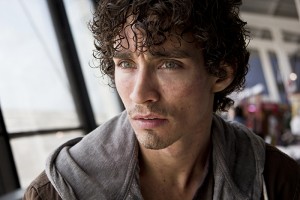By Cleaver Patterson.
As the autumn nights draw in and winter fast approaches, the season seems more disposed to cinematic tales which induce unease within the viewer. The time is then perfect for the release of The Messenger (2015), a psychological chiller from BAFTA and Emmy winning British director David Blair, featuring Robert Sheehan, Lily Cole and Joely Richardson. Not only is this a genuinely unsettling film but it also — unusually for many modern horror films — provides mental challenges for the viewer instead of mere visual frights.
 Jack (Sheehan) has serious issues, resulting in him having become a loner and increasingly reclusive. The only people, apart from his sister Emma (Cole), with whom he has any real contact are the dead, which is where the problem lies. Jack believes himself to be a go-between, communicating messages from those who have passed over to the loved ones whom they have left behind. This ‘gift’, needless-to-say, puts him at odds with the general public who he comes into contact with every day. This he can live with, if only just. It’s when he becomes involved with the murder of a local journalist, though, that life as Jack knows it really starts to take on a disturbing new edge, one which threatens to push him beyond the edge of sanity.
Jack (Sheehan) has serious issues, resulting in him having become a loner and increasingly reclusive. The only people, apart from his sister Emma (Cole), with whom he has any real contact are the dead, which is where the problem lies. Jack believes himself to be a go-between, communicating messages from those who have passed over to the loved ones whom they have left behind. This ‘gift’, needless-to-say, puts him at odds with the general public who he comes into contact with every day. This he can live with, if only just. It’s when he becomes involved with the murder of a local journalist, though, that life as Jack knows it really starts to take on a disturbing new edge, one which threatens to push him beyond the edge of sanity.
Some films are creepy, pure and simple. Eschewing over-the-top special effects and visceral horror, they prefer to create impact through the use of suggestion and inference. The chill they induce in the viewer is psychological as opposed to physical: a type which is genuinely more unnerving because it’s real, a disturbing horror which gets inside your head and stays there, well after the film has finished. The Messenger is just such a film. It’s strongest attribute is in its creation of atmosphere through tension. While most modern films that categorise themselves within the horror genre will, to a greater of lesser degree, contain some elements of the visceral, here we have a film which on the whole avoids this approach. Instead, straight from the start when Jack is involved in an attempt to prevent a suicide, the film makes it quite clear that angle that it is taking, with much of the film’s real horror arising from personal connections, interactions and deeper, inner turmoil. Jack’s relationship with his sister, and her husband and son, and the recurring dreams of his own father’s death and the effect it had on his remaining family, haunt the proceedings through intermittent flashbacks and are the stuff of real, tangible and lasting horror — deep-seated fears which everyone can relate to.
 These strengths however, wouldn’t be as effective if it wasn’t for those bringing them alive on the screen. The three main protagonists – Sheehan, Cole and, to a lesser degree, Richardson (who gives her own marvellously troubled performance as Jack’s well-meaning psychiatrist) are captivating. Sheehan, with an unruly and disheveled look, is perfectly cast as the brooding and misunderstood Jack, whilst Cole’s heartfelt performance as his concerned sister battling with her own inner-demons proves why her career-change, from the super-model to actor, was an astute move on her part. These two young actors hold together a story which, due to its subject matter, may have verged on the ludicrous in less accomplished hands. Their portrayals of Jack and Emma are heavy with pathos, evoking sympathy from the viewer for characters and situations which seem startlingly real.
These strengths however, wouldn’t be as effective if it wasn’t for those bringing them alive on the screen. The three main protagonists – Sheehan, Cole and, to a lesser degree, Richardson (who gives her own marvellously troubled performance as Jack’s well-meaning psychiatrist) are captivating. Sheehan, with an unruly and disheveled look, is perfectly cast as the brooding and misunderstood Jack, whilst Cole’s heartfelt performance as his concerned sister battling with her own inner-demons proves why her career-change, from the super-model to actor, was an astute move on her part. These two young actors hold together a story which, due to its subject matter, may have verged on the ludicrous in less accomplished hands. Their portrayals of Jack and Emma are heavy with pathos, evoking sympathy from the viewer for characters and situations which seem startlingly real.
If anything is to be said against the film it’s probably in the sense of grimness evoked by the locations where it plays out. Blair cut his directorial teeth on British television dramas like The Lakes and The Street, saturated with the same dark, British ‘Northernness’ which permeates The Messenger. However, as this heavy aura is in tune with the film’s overall subject matter, it proves a minor concern in a production which, like Jack himself, will linger in the mind for a long time to come.
Cleaver Patterson is a film journalist and critic based in London. He is the News Editor of Flickfeast website, and regularly contributes to a number of other publications and websites including Rue Morgue and Film International.

